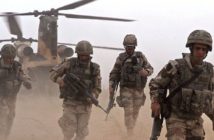Magharebia![[AFP/Mohammed Huwais] Yemeni militants hold a black al-Qaeda flag as a judge sentences them to prison for plotting terrorist attacks.](http://magharebia.com/awi/images/2013/10/04/131004ReportagePhoto1-650_429.jpg)
[AFP/Mohammed Huwais] Yemeni militants hold a black al-Qaeda flag as a judge sentences them to prison for plotting terrorist attacks.
Faisal Darem in Sanaa and Jemal Oumar in Nouakchott contributed to this report for Magharebia – 04/10/2013
Terror infighting could spell trouble for the global al-Qaeda network, experts say.
Mokhtar Belmokhtar’s split from al-Qaeda in the Islamic Maghreb (AQIM) raises questions about the overall strength of the parent organisation, analysts say.
In late August, al-Qaeda splinter group Katibat El Moulethemoune (“Brigade of the Veiled Ones”) led by Belmokhtar (real name Khaled Abou El Abass) joined forces with the Movement for Tawhid and Jihad in West Africa (MUJAO) to create the “Mourabitounes”.
To local experts, the move looks like the only option left for jihadists ostracised by al-Qaeda’s Maghreb leadership. The former AQIM commander had already been cut off by the organisation.
“New factors, such as money and leadership, replaced ideological convictions,” analyst Abdallah Bin Maalum says. These enticements, he explains, “undermined any alliance between men who no longer shared conviction in jihadist ideology that has been the basis for their armed action”.
But after Belmokhtar’s (aka “Laaouar”) “Signed in Blood” brigade was decimated in the January siege at Algeria’s In Amenas oil field, he had no choice but to build new ties. His move was one born of desperation, analysts say.
But the parent organisation is also imperilled by his decision to go it alone.
Laaouar, known as the “Marlboro Man” for his long history of smuggling, released a video in early September showing details of the new brigade’s attacks in Mali, Algeria and Niger.
Belmokhtar is also seen giving instructions for the twin suicide car bombings in Niger’s Agadez and Arlit.
But according to Journal Tahalil editor and terrorist expert Isselmou Ould Moustapha, the merger could have multiple implications for the future of the parent organisation.
The Mourabitounes may try to “supplant AQIM in the Sahel-Saharan region, where al-Qaeda lost capabilities and leaders, such as Abou Zeid”, he explained. “The survivors have returned to Algeria, the south of Tunisia and Libya.”
“The groups thrown out of Mali – greatly weakened by air strikes and near-suicidal operations – seek to restore an operational tempo that has much abated in recent months,” he said. “They do not even have the potential for taking hostages, their main source of income.”
Fares Saqqaf, the head of the Centre for Future Studies in Yemen, points out that “al-Qaeda actually finds fertile ground whenever the countries where it operates are unstable”.
“That is where the branches of the organisation grow strong, as is the case in Syria, Iraq, and also the Arab Maghreb,” the Yemeni expert adds.
Everything is connected, he tells Magharebia.
“When Ansar al-Sharia appeared in Abyan, Yemen, Ansar al-Sharia appeared also in Mali. They all stem from the international organisation,” Saqqaf says.
“Every time a branch becomes more successful, it positively affects, at least morally, the other branches. But when one branch experiences a split or receives hard blows, or when its leaders are killed, it confuses plans at both the local and international levels,” he adds.
The Tiguentourine siege weakened Laaouar and his fighters even more.
This weakness, Saqqaf adds, will lead the group to “carry out superficial terrorist operations for propaganda, to show that it still exists, yet without the parent organisation reaping any gains”, Saqqaf says.
“It is still too early to know the full extent of the defection of the ‘Signed in Blood Brigade’,” says Sanaa analyst Saeed Obaid al Jomhi.
But the loss of fighters, especially if they are trained combatants, is risky, Al-Jomhi says. Thus Belmokhtar defected from al-Qaeda to avoid further losses.
“Al-Qaeda’s leaders justify the defection of some militant groups as a form of Ijtihad. Hence they can say the splinter groups are still being part of the organisation, and that they did not defect,” he adds.
Belmokhtar is desperate to show that he “still has the strength to continue the fight in the Sahel”, filmmaker Zine El Abidine Ould Bukhari tells Magharebia.
Yet with his forces weakened and divided, he is now “seeking to reunite the remaining pieces and rebuild an organisation through publicity campaigns and buying weapons”, Sahara Media journalist Bashir Ould Babana suggests.
For his part, Dr Saeed Abdul Momin, a researcher in strategic affairs, says: “The idea that initiated the organisation is starting to lose its appeal and the methods of implementing it are leading to dissension.”
“The senior leadership is no longer a unifying arm, and that is why cracks are showing.”
Abdul Momin adds, “No one knows yet the true size of Belmokhtar’s group and whether it is a real split or a media bomb, and if it will compete with al-Qaeda in the Maghreb on the ground and enter into conflicts with it, or if it will turn into an independent faction of the organisation, without getting into disputes with it or settling scores to control the field.”
“The idea that different branches of the organisation can work together has not arisen yet because their relationship is not governed by clear regulations. Operations are usually individual and most of the time, they need a security lapse to even proceed,” he adds.
“Jihadists in countries such as Yemen and Syria and those belonging to AQIM and its affiliates are all seeking to fight the Western presence and establish Islamic states based on Islamic law,” security analyst Anfar Sidi told Magharebia. “However, they lack co-ordination.”
But according to analyst Ibrahim Ould Saleh, the presence of Maghreb jihadists in other countries is a boon for Belmokhtar.
“Thousands of young people are fighting with al-Qaeda affiliate Jabhat al-Nusra in Syria. They are also in Yemen,” Ould Saleh tells Magharebia. “If attempts by al-Qaeda to establish an Islamic state fail there, it is certain then that these fighters will return to their home countries, carrying with them their terrorist past and present. Their home countries will then have to face the challenge.”
Maghreb countries must prepare to meet these challenges now, he stresses. “Efforts should not be individual. Rather, co-ordination should be intensified among these countries to deal with the terrorists of the future,” Ould Saleh says.
“If this does not take place, then the risk is high that the fighters will generate major security problems in the Maghreb and Sahel, providing an opportunity for Belmokhtar and his friends to attract more recruits,” he adds.






